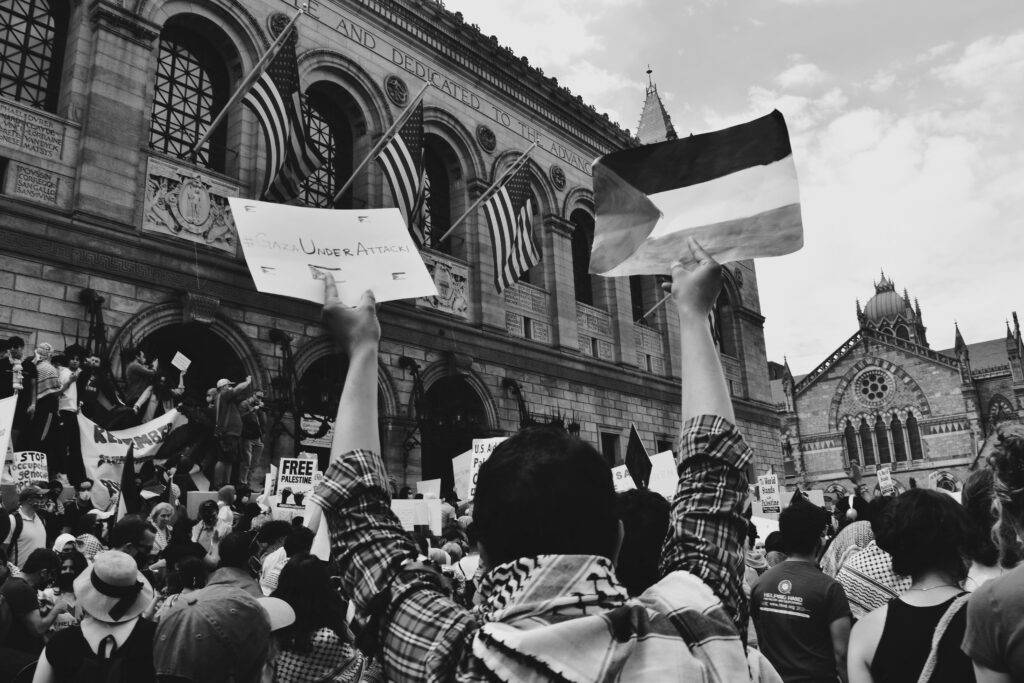
Following the barbaric terrorist attack of 7 October 2023 on innocent Israeli civilians, large numbers of young Westerners came out in support not of the victims but of the perpetrators. Many not only failed to condemn Hamas, a genocidal Islamofascist organisation, but even celebrated the atrocities committed. There is clearly a moral confusion here. What might explain it?
It is easy to see why young, uneducated Muslims raised in a fundamentalist culture rife with antisemitism might side with Hamas. But a keffiyeh-clad UPenn student glorifying rape, murder, torture and kidnapping before a jubilant crowd of her peers? That calls for a deeper explanation.
As a former radical, who grew up middle-class in Austria and became involved with the international far-left and anarchist scene through punk culture in the late 1990s, I am familiar with such callousness. And I know a thing or two about the mentality behind it, the social dynamics at play and how ideology corrupts young, impressionable minds. I also know from experience that the spell of radicalism can be broken.
At the time of the September 11 terrorist attacks, I was part of an anarchist-leaning underground scene that interpreted the tragedy in the context of the chickens coming home to roost. We saw the capitalist West—in particular the US, with its Middle Eastern ‘outpost’, Israel—as a global oppressor. This made Al-Qaeda’s terrorism seem somewhat justified. Many in our circles reacted with glee or even admiration. After all, ‘Down with Western civilisation’ was one of our slogans.
Like the progressives defending Hamas today, we were deeply confused about the intentions and worldview of the perpetrators of 9/11. Our enemy’s enemy, we assumed, was our friend. As one American activist with a similar social background to mine, who found himself in Washington, DC on the day of the attacks, reported in the anarchist periodical Rolling Thunder,
‘I wished I could put a black flag on the roof so whoever the fuck was behind this would know we were anarchists trying to fight capitalism and the state, who had no great love for the U.S. government—so please don’t kill us, thank you very much!’
However, a common enemy does not imply shared values or goals. The Islamist mass-murderers who hijacked those planes clearly did not share the anarchists’ ‘dreams of a more compassionate world’, an oft-repeated mantra that belies their rationale. ‘Many of [the people killed] had been running the financial apparatus of global capitalism, pushing the buttons that calculated the numbers written in the blood of the poor,’ according to the young anonymous activist in DC. In other words, they had it coming. Yet despite these claims, many of those killed in the 9/11 attacks were just ordinary people: adults, children and even unborn babies.
Similarly, young Hamas apologists today tend to look at those savagely brutalised on 7 October not as innocent civilian victims but as avatars of the ‘Zionist entity’. In this dehumanising view, which denies the historical connection of the Jewish people to Palestine, every Israeli is, by definition, an occupier complicit in the oppression of Palestinians. Some anti-Zionists have gone so far as to argue that there is no such thing as an Israeli civilian. This, in part, explains why misguided young radicals feel justified in ripping down or defacing posters of kidnapped Israeli civilians—including children.
Like me and my anarchist peers at the beginning of the millennium, these radicalised young people have learned to view the world through a low-resolution lens of oppressor and oppressed. Through this lens, Palestinians can do no wrong, because they are assumed to be the oppressed group. In the words of Hamas leader Ghazi Hamad: ‘We are victims … everything we do is justified.’ Yet Hamas-controlled Gaza had not been under Israeli occupation since 2005, although it must be conceded that, according to Aljazeera, ‘Israel has maintained strict control over Gaza’s airspace and territorial waters and restricted the movement of goods and people in and out of the enclave.’
Conversely, since the Jewish state is seen as the oppressor, Jews do not qualify as victims. Of course, this ignores the well-documented fact that Jews are undoubtedly one of the most victimised groups in history. Their demonstrable success in the face of such adversity, however, in areas ranging from business to culture and science—Jews are greatly overrepresented among Nobel laureates—contradicts the prevailing progressive narrative that disparities in outcome necessarily imply unearned privilege and power. This fallacy is also central to antisemitism. Not for nothing was antisemitism referred to as ‘the socialism of fools’ as early as the nineteenth century.
Another oft-committed fallacy is that of moral equivalence. The argument goes that many more Palestinians than Israelis have died in the generations-long conflict, as if that would somehow excuse Hamas’s orgy of violence on 7 October. While it is legitimate to criticise Israel’s devastating military response, intent does not even enter into the equation. In the same fashion, the radical community I was involved with back in the early 2000s morally equated US and UK military action with Islamist terrorism. We, too, failed to differentiate between collateral casualties and the deliberate targeting of non-combatants. All that mattered was the number of dead on either side.
If it is all about numbers, however, it makes no sense to accuse Israel of ‘genocide’, at least as a consistent policy over the long term, since both Gaza and the West Bank have seen significant population growth. The same is true for Arabs living in Israel, whereas Jewish populations in Arab countries have declined dramatically. Considering these long-term trends and the fact that Israel has, for many decades, had the military strength to conquer and ethnically cleanse the Palestinian territories, it is just not plausible to assume that the motivation behind the current war against Hamas is genocidal. This is not to deny that we are witnessing a humanitarian tragedy on the ground in Gaza. But anti-Israel protesters calling for a (unilateral) ceasefire forget that Hamas could instantly end the war by releasing all Israeli hostages and surrendering.
Nor is Israel an ‘apartheid state’, as many young protesters have claimed. Such rhetoric has a long tradition among radicals and serves to morally discredit the enemy, in this case a multi-ethnic democracy that grants equal rights to all its citizens, including, of course, the 21.1 per cent who are Arabs. This is not to ignore the fact that Arabs have been discriminated against, mistreated and displaced in the context of Israeli occupation and settlement. However, by perpetuating fundamental misconceptions about Israel as a nation, young pseudo-justice warriors in the West have made themselves into useful idiots for antisemitic theocrats in the Middle East. Greta Thunberg did the jihadists’ bidding when she appeared on stage donning a keffiyeh and chanting, ‘No climate justice on occupied land!’ The George Washington University students who projected the words ‘Glory to our martyrs’ onto a campus building were more explicit in their approach. But the message was the same: Hamas is engaged in a just war of resistance. In a cynical reversal of victim and perpetrator roles, Hamas’s terror against Jews has thus been reframed as restoring justice ‘from the river to the sea’, in a slogan which carries genocidal implications.
Funded in large part by autocracies such as Iran and Qatar, Hamas seeks to wipe Israel off the map. This is not just because the Jewish-majority country receives military and financial support from the hated US, but also because it is seen as an alien entity in an otherwise Muslim-dominated region of the world. The events of 7 October have, once again, made clear that, for Hamas, killing Jews is an end in itself. This is not to suggest that all Gazans share this attitude or deserve the death and destruction inflicted upon them. But it would be a mistake to downplay the role of radical Islam, martyrdom and antisemitism in this conflict, especially considering that Palestinian support for Hamas has soared since the beginning of the war.
Still, most young Western anti-Israel protesters, even those openly sympathetic to Hamas, will deny allegations of antisemitism. In addition to the antisemitic tropes used at their protests, however, their obsessive focus on the world’s only Jewish-majority country, founded to protect Jews from genocide and persecution, is itself indicative of antisemitism. Tracing Zionism’s historical roots, the writer Ralph Leonard notes in the Freethinker that ‘early Zionist thought made its claims not in the name of the Jewish faith, but of the Jewish people’. This is a crucial distinction to make—because antisemitism targets Jews as a people. Nor is the conflict in the Middle East primarily about religion, although both sides invoke it, and although Hamas is a radical Islamist organisation.
While some anti-Zionists naively assume that once Israel has been obliterated, the remaining Jews will be permitted to live in peace in a ‘liberated’ Palestine, others just do not seem to think that Jewish lives matter—for otherwise they would not want Israeli Jews to become a vulnerable minority again.
Strong anti-Israel sentiments were also common in the radical underground of the early 2000s and influenced the way we made sense of September 11. For us, Israel was an illegitimate occupier of Palestinian land that had to be defeated. Anyone who supported it we regarded as complicit in the oppression of the Palestinian people and thus as a legitimate target for the ‘global Intifada’. This included civilian infrastructure. Naturally, we also boycotted Israeli products so as not to support the ‘occupation’. None of this seemed antisemitic to us. As one anarchist propagandist argued in 2006, ‘[T]he cost of the establishment and perpetuation of the state of Israel has been colossal in terms of the suffering and death of both Israelis and Palestinians.’
What is missing from this analysis is the counterfactual: what would happen in the absence of a Zionist state in the Levant? On 7 October, Hamas gave us a brutal taste of what that would mean for Jews. Antisemitism is rampant across the Arab world. Moreover, ‘Israel’s establishment brought many benefits to the Arab population in the region,’ according to the now-deceased Israeli diplomat Moshe Arens. ‘An Arab victory in the 1948 war against Israel,’ he wrote, ‘would not only have led to the destruction of the Jewish community here, but would most likely have caused havoc and suffering to the local Palestinian population.’
As a former Israeli official, Arens was, of course, biased. But he had a point: by cultivating large swathes of previously unploughable land, Zionist settlers laid the foundation for Israel’s thriving economy, which created unprecedented opportunities for Palestinian Arabs. Had Israel been defeated in 1948, the area would most likely never have blossomed into the prosperous, multi-ethnic, democratic nation it is today. In all likelihood, it would instead be indistinguishable from the countries it borders.
Of course, this does not give Israel carte blanche. In my experience, however, progressive radicals rarely entertain such counterfactuals or question their ideological assumptions. While my peers and I styled ourselves open-minded critical thinkers, we clung to our axiomatic beliefs. But our hostile stance toward Israel and its allies in the West did not go unchallenged in the post-9/11 era. When, for example, a member of a punk rock band from our milieu was seen sporting a T-shirt with the slogan, ‘Burn, Israel, burn’—in Germany, of all places!—the group was collectively accused of antisemitism and had several concerts cancelled.
Part of the reason the group found themselves banned from left-wing music venues across Germany was that the Anti-German movement was gaining ground among German leftists at the time. A typical banner of this political group read, ‘Down with Germany, solidarity with Israel, for communism.’ Anti-Germans supported the US after September 11 because of its instrumental role in liberating Europe from Nazism; they also supported Zionism as a matter of principle in light of the Holocaust.
Back then, our main point of criticism of the Anti-German movement was that its ideology was one of collective guilt rooted in German identity. Young radicals today, however, seem to have no qualms about embracing such identitarianism when it comes to race, gender and so on. What is more, our anarchist principles—‘no gods, no masters’—stopped us from ever siding with governments, much less with theocratic ones. The same cannot be said for activists who support Hamas.
Nevertheless, today’s protest movement strongly reminds me of my experience as a young radical. We were absolutely convinced of the righteousness of our cause: the end justified the means. Nor did we lose sleep over potential unintended consequences or seek out information that contradicted our preconceived notions. We interpreted major world events, such as 9/11, through the narrow and distorting prism of our radical ideology. As would-be revolutionaries, we were unscrupulous optimists, blind to the ever-present danger of retrogression and unappreciative of the civilisation we had inherited.
However, ours was a fringe ideology confined to underground echo chambers—along with, as I found out later, certain pockets of academia. So what explains the prevalence of a similar belief system and attitude among young people today? The September 11 attacks, after all, were not followed by mass youth protests in support of the terrorists, at least not in the West.
While mass immigration from the Muslim world has certainly exacerbated the situation, it is no secret that radical professors in the humanities and social sciences have, for decades, been teaching students to scorn Western civilisation, with its emphasis on reason and science, to problematise ‘whiteness’ and embrace ‘decolonisation’.
This worldview took root in academia in the context of postcolonialism under the influence of the Palestinian-American scholar and activist Edward Said, who, as early as 1978, critiqued Western discourses about the Orient as a form of imperialism. Drawing on Michel Foucault’s ideas about language and power, postcolonial thought has since found its way into many fields of study. For example, a 2013 article in the journal The Canadian Geographer set out to ‘advance personal and educational decolonization [and] interrogate how whiteness continues to be normalized within environmental education through various dominant narratives [and] the ongoing erasure of Indigenous Peoples.’
Race entered the picture with the rise of Critical Race Theory (see below) and its offshoot, Whiteness Studies. The latter constitutes a form of activist scholarship aimed at ‘dismantling white supremacy,’ which it views—based on Foucauldian discourse analysis—as the underlying power structure of the West.
When contextualised as a non-white, indigenous liberation movement against Western-supported ‘settler colonialism’, Hamas ticks all the boxes. With its murderous bigotry theorised away or simply ignored, the terrorist organisation that has ruled Gaza with an iron fist since 2007 has become something of a poster child for progressives. Add to that the fashionable notion that all forms of oppression are interrelated, and all oppressed groups are natural allies by virtue of their oppression by Western society and its power structures, and you end up with absurdities such as ‘Queers for Palestine’.
University students defending Hamas often find support from faculty. Such support appears to be more ardent among the humanities and social sciences than in STEM, business, economics and law. At Columbia University, two open letters were issued following the massacre of 7 October, one defending and one condemning students’ defence of Hamas. An analysis of the signees’ affiliations revealed that, unlike in the other departments, a majority of faculty members in the humanities and social sciences supported rather than condemned pro-Hamas sentiments among the student body.
The professors, in other words, are backing their radicalised protégés. This highlights a general problem with the progressive movement today: a lack of adults in the room. It is only natural for rebellious youth to be attracted to a protest movement that rejects societal norms and values. And because it challenges the established order, Palestine is a perfect issue to rally around. However, without adequate boundaries being set by their teachers and mentors, radical students are running wild on campus and beyond.
Even high school students have joined the anti-Israel movement. Street protests and school strikes are one thing. But hundreds of fanatical teenagers rampaging through the halls of a high school after discovering a Jewish teacher had attended a pro-Israel rally, and forcing the terrified educator to hide in a locked office, is another thing altogether. One is reminded of the 2017 Evergreen State College turmoil and hostage situation, which occurred because a professor, Bret Weinstein, had objected to an initiative barring white students and faculty from entering campus. A self-righteous student mob formed and accosted Weinstein before effectively taking university staff, including college president George Bridges, hostage in a conference room. Today’s teens have seen radical groups such as Black Lives Matter enforce their ideology through violence and intimidation. A defining moment was the BLM-Antifa riots of 2020.
Under the influence of such groups, young people have also learned to identify oppression with ‘whiteness’. The latter is both a racial concept and a shorthand for the liberal-humanist value structure of the West. Based on American notions of race and racism, this ideology treats Jews as essentially white and Palestinians as ‘BIPOC’ (‘Black, Indigenous and People of Colour’). This helps explain recent slogans such as ‘You’re either on the white or right side of history,’ spotted on a placard at a pro-Palestine demonstration in the UK, with the flags of Israel, the US, the UK and France surrounding the word ‘white’. Note that these nations are all liberal democracies, unlike the places represented by the flags around the word ‘right’: Palestine, Congo, Sudan and East Turkestan.
It is crucial to understand that what we are dealing with here is an anti-liberal ideology based, among other things, on Critical Race Theory, which originated with American legal scholars such as Derrick Bell, Richard Delgado and Kimberlé Crenshaw. As the jurist Jeffrey J. Pyle explained in 1999, ‘Critical race theorists attack the very foundations of the liberal legal order, including equality theory, legal reasoning, Enlightenment rationalism and neutral principles of constitutional law.’ This is because they regard liberal values as ‘mere social constructs calculated to legitimate white supremacy.’ And while they ‘purport to share the liberals’ goal of racial and social justice, they view that endeavour not as a matter of principle, but as a matter of simple group interest to be achieved ‘by any means necessary’.
When I was first taught to ‘problematise whiteness’ in an American Cultural Studies course at university, I was intrigued by the esoteric rhetoric and progressive pretensions of this obscure—and obscurantist—philosophy, which seemed to offer a new language for the broader revolutionary struggle against oppression. What put me off, though, was its monomaniacal focus on race and its tendency to accuse an entire group of people of racism just by virtue of their skin colour. My radicalism, after all, was colourblind. It would have never occurred to me, for instance, to frame the September 11 attacks in terms of ‘brown people v. white people’.
That was twenty years ago. Since then, a bloated Diversity, Equity and Inclusion (DEI) bureaucracy, informed by the same theories, has usurped the West’s institutions of science and learning, making its ideology mandatory policy. And it does not stop there. Cloaked in the language of civil rights, it has also spread to the realms of business, politics and culture. The Jewish-American journalist Bari Weiss has described the underlying belief system as
‘… a worldview that replaced basic ideas of good and evil with a new rubric: the powerless (good) and the powerful (bad). It replaced lots of things. Color blindness with race obsession. Ideas with identity. Debate with denunciation. Persuasion with public shaming. The rule of law with the fury of the mob.’
For Weiss, this worldview has antisemitic implications:
‘For Jews there are obvious and glaring dangers in a worldview that measures fairness by equality of outcome rather than opportunity. If underrepresentation is the inevitable outcome of systemic bias, then overrepresentation—and Jews are two percent of the American population—suggests not talent or hard work, but unearned privilege. This conspiratorial conclusion is not that far removed from the hateful portrait of a small group of Jews divvying up the ill-gotten spoils of an exploited world.’
Easily the most powerful catalyst for the propagation of this ideology, in particular among young people, has been the rise of social media, with the legacy media trying to keep up. Loud minorities have seized a megaphone to shame and intimidate a silent majority afraid of being called out or cancelled, while algorithms designed to boost engagement have functioned to reinforce echo chambers, increase polarisation and accelerate social contagion.
But perhaps the most consequential aspect of social media has been that it has created compelling alternative realities for young people lacking real-world experience. Like progressive ideologues in academia, those living online tend to measure truth not by whether their views correspond with objective reality, but by whether their equally biased peers agree, a phenomenon scientists have described as the ‘echo chamber effect on social media’, which works by ‘framing and reinforcing a shared narrative’. It is no wonder, then, that there are people out there who deny the truth of the Hamas massacre of 7 October 2023 or call it an ‘inside job’— in other words, who are taken in by conspiracy theories that play on the portrayal of Hamas as the victim.
I fell for similar conspiracy theories back in the day, and for similar reasons. In the mid-to-late 2000s, movies such as Zeitgeist, Loose Change and Fahrenheit 9/11 set out to challenge the ‘dominant narrative’ about what had happened on 11 September, 2001. More importantly, however, these movies confirmed my community’s anti-American outlook. Hardly any of us put it past the US government to have staged, orchestrated or at least facilitated the attacks as a pretext to go to war for oil. This goes to show that echo chambers have always existed. In terms of scale and reach, however, social media has completely changed the game.
Israel’s enemies know very well how to exploit social media for their propaganda machine. Online jihadis bombard young users with emotionally charged half-truths and misinformation. But even they must have rubbed their eyes in disbelief when they saw Osama Bin Laden’s newly recirculated and blatantly antisemitic ‘Letter to America’, in which he justifies 9/11 on the basis of US support for Israel, go viral on TikTok. Nor did my former life as a radical prepare me for such a trend. Having said that, perhaps if I had read the letter as a young radical, I too would have found parts of it compelling. However, in the absence of social media, my ability to publicly advertise my ignorance on the matter would have been limited.
This points to another major problem with social media: it incentivises young people to share their opinions on subjects they know nothing about. There is almost an expectation to take a political stance. Indeed, a failure to do so could arouse suspicion and lead to ostracism. However, as shown by scientific evidence, it is probable that the brain is not fully developed until the age of about 25. This, and the sheer intellectual difficulty of forming a coherent philosophical ideology, may help explain why overly simplistic ‘takes’ prevail online and offline, especially among the young. Sloganeering has replaced reason and intellect by packing broad socio-political concepts into easily consumable and endlessly repeated catchphrases, which young people have latched onto. Nor is there any incentive to consider counterfactuals, or simply think things through, before posting or chanting slogans such as ‘globalise the Intifada’. On the contrary, unthinking regurgitation signals loyalty to the tribe.
Before the internet and social media, such slogans and catchphrases often reached us in the form of song lyrics through the underground music scene. I was in my late teens when a punk rock lyric shaped my understanding of the Israeli-Palestinian conflict for years to come: ‘Fuck Zionism’. Judging from my experience, youth culture undoubtedly has the power to mould a young person’s political worldview, especially if complex political issues are presented in the form of such overly simplistic slogans. I was not particularly rebellious as a teenager, but I responded to radical messages of this sort on a visceral level.
There is also the thrill of joining a movement, which can offer a sense of meaning, purpose and belonging to young people. As a radical, my social identity was tightly interwoven with my politics. This made it difficult to apply sufficient scepticism to the beliefs professed by my peer group. The same dynamic appears to be at play when we see masses of young progressives parroting the slogans of antisemitic extremists online and in the street.
A more charitable and optimistic interpretation is that today’s young people have an appetite for justice: they identify injustices in the world and want to be part of the solution. I can relate to that. The problem is that they have been misled. Had they not been so deceived, they would be protesting Hamas’s theocratic terror regime, which not only indiscriminately butchers Jews, but also holds its own people hostage and uses them as human shields. They would understand that people who behave in this way are not seeking justice, and they would act accordingly rather than engage in the theatre of radicalism.
However, it may not be too late for these young activists to see the errors of their way and change course. I am living proof that this is possible: I overcame my radicalism and learned to value the peace, freedom and prosperity characteristic of Western liberal democracies. For me, the turning point came when I understood that these are extraordinary and fragile civilisational achievements, and that neither the West nor Israel is primarily to blame for other cultures’ failure to build free, peaceful and prosperous societies. Of course, the West, broadly defined, has a lot to answer for; however, its cultural and economic achievements stem from a set of values and ideas rooted in Enlightenment humanism. Radical Islam, as propagated by Israel’s enemies Hamas, Hezbollah and the Houthi movement, negates these values and ideas.
There is no way round it: the young people supporting Hamas and its allies on social media, on campus and in the street must come to their senses and abandon their erroneous preconceptions. ‘We can offer something else in return,’ says ex-Muslim author and human rights activist Ayaan Hirsi Ali, who would have sided with the protesters in her youth. ‘But we do have to work for it, and we do have to agree on the basis of what it is that we want to transmit.’ She elaborates:
‘One of the questions that I have asked myself is: What is it that [Muslim] immigrants have in common with Gen Z? … both groups have been failed by us, because we are failing to transmit to Gen Z, and we are failing to transmit to immigrants who come here, what it is that they are going to inherit, what this society is all about, the most basic, fundamental principles of this society.’
While the reasons for young people’s current moral confusion about Hamas are manifold and call for a diversified response, this certainly seems like a good starting point. It is up to us to pass on the Enlightenment tradition of the West to the next generation—whatever their cultural and religious background. We must lead by example and stand up against antisemitism in all its forms. We must defend liberal values from corrosive ideologies and refuse to be intimidated. We must do our best to make young people understand what is at stake, and that Hamas is the antithesis of whatever it is they think they are fighting for. Many will not listen. But some will.


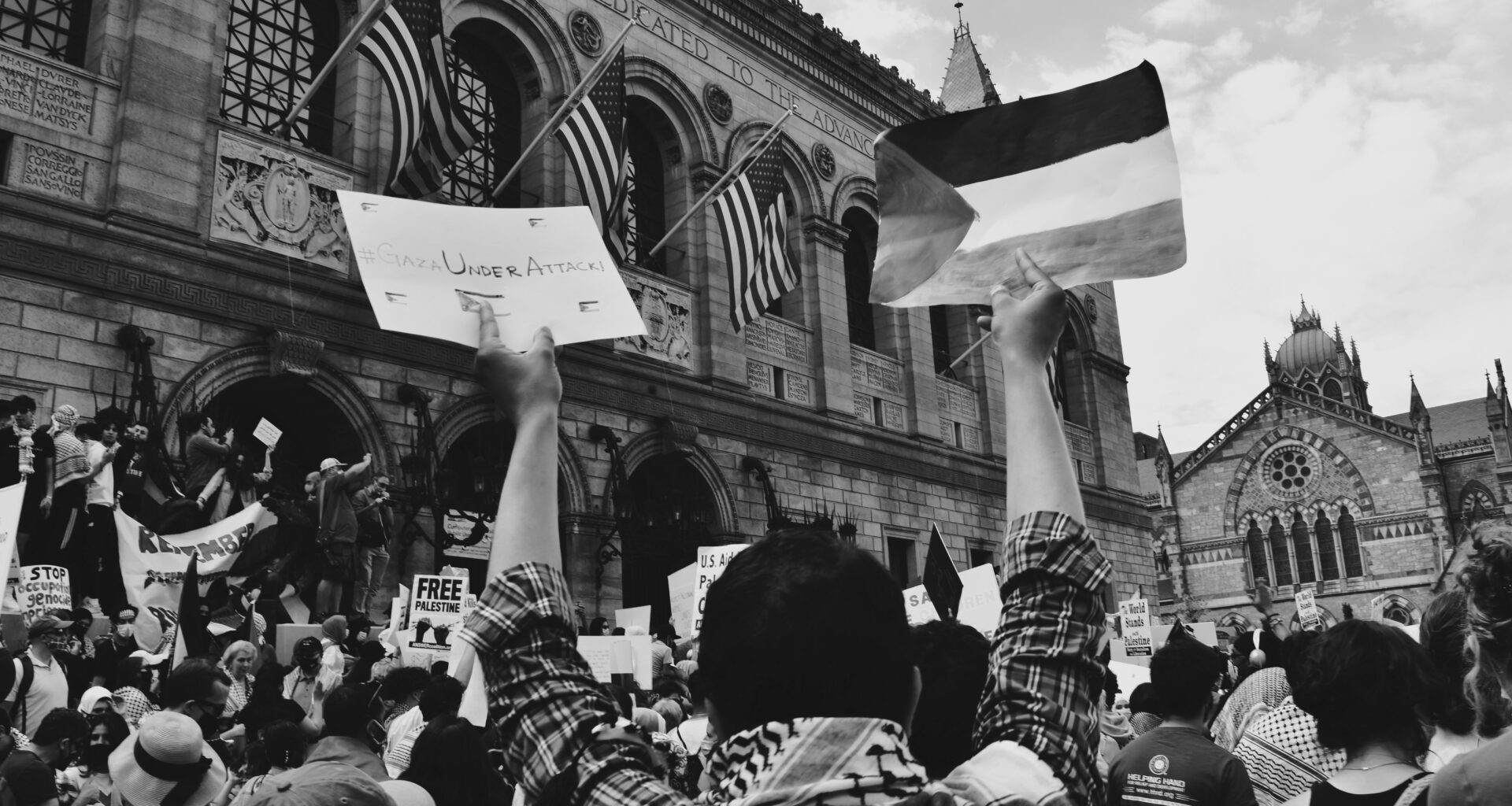
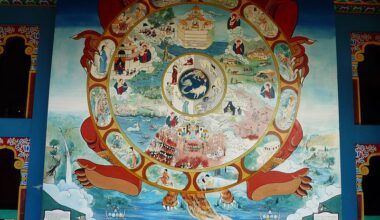
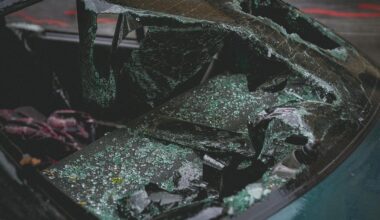


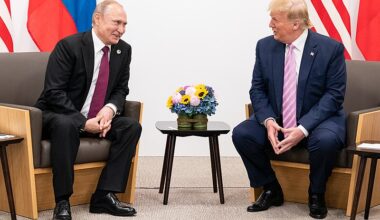

2 comments
Do the counter-enlightenment young understand how the world was before the 17th century? The West was “Christendom.” Church and crown were everything. The individual was nothing. The vast majority (95%+) lived in extreme poverty. The young are generally ignorant. However their professors, who have indoctrinated them, should know better but obviously don’t. The intimidated silent on campus need to emulate our author here and speak up.
I stopped reading this article less than half-way through. It is far too long and far too apologetic where zionism is concerned. I have been to the West Bank and Israel, and I have seen the third or fourth class status accorded to Palestinians. The fact that the Israeli authorities permitted developments to take place right up to the border with Gaza was a standing provocation to the Gazans to respond. The author of the article is typical of the individual who migrates – usually for financial reasons – from an ultra-left position to an ultra-right position. He is on the side of the oppressors and not on the side of the oppressed. Dating right the way back to even before the Balfour Declaration, the Palestinians have been shafted successively by Turkish, British and American imperialism. The zionists were allowed in in increasing numbers to protect the Suez Canal as the British authorities considered the Palestinians to be too unreliable to carry out the same task on their behalf. As in Northern Ireland, the british Empire required a mini-Ulster of its own in the Middle East. Most of the people living in former British Mandate Palestine are probably not even descended from the original Judeans who may or may not – have lived there originally, Most Mizrachim Jews can possibly claim such descent but the Sephardim and Ashkenazim cannot. Israel is an illegal UDI state and should never have been recognised by western powers (primarily USA) or the former soviet bloc.
Your email address will not be published. Comments are subject to our Community Guidelines. Required fields are marked *
Donate